 KNIT OUT THE VOTE!  Knitters, use your talent to turn out the vote, this year and every election year, because there are no off-year elections! Every election is crucial! Knit them, wear them, distribute them. Use your favorite hat pattern with the chart below, or visit https://www.ravelry.com/ and enter “vote” and “hat” in the search engine. Get creative. Use colors and patterns that will remind people of why voting matters. Pussy hats; rainbow hats; red, white, and blue hats -- whatever message you’d like to send. Make this a thing. Share pictures and patterns #KnitOutTheVote
0 Comments
Links for Action on Gun ViolenceWebsites for Action on Gun Regulation
Unless noted, all of the organizations listed below have high scores on Charity Navigator. Italicized quotations are excerpts from their missions as posted on Charity Navigator or their websites. For the sake of brevity, this list is not exhaustive. Nonprofits That Address Gun Violence Brady There is no one solution to end this epidemic of gun violence and no one side has the answer. So our comprehensive approach fights every problem with more than 45 years of research and real-world experience. Educational Fund to Stop Gun Violence The Educational Fund to Stop Gun Violence identifies and implements evidence-based policy solutions and programs to reduce gun violence in all its forms. We make communities safer by translating research into policy, and achieve this by engaging in: Policy Development, Advocacy, Community and Stakeholder Engagement, and Technical Assistance. Every Town for Gun Safety Everytown for Gun Safety Support Fund seeks to improve our understanding of the causes of gun violence and the means to reduce it - by conducting groundbreaking original research, developing evidence-based policies, and communicating this knowledge in the courts and the court of public opinion. Gifford's Law Center to Prevent Gun Violence Educate the public about the state of gun violence and propose solutions that increase the safety of communities by encouraging personal responsibility and common sense policies. Violence Policy Center The Violence Policy Center (VPC) is a national educational foundation that conducts research on violence in America and works to develop violence-reduction policies and proposals. Wear Orange (not found on Charity Navigator) On January 21, 2013, Hadiya Pendleton marched in President Obama’s second inaugural parade. One week later, Hadiya was shot and killed on a playground in Chicago. Soon after this tragedy, Hadiya’s childhood friends decided to commemorate her life by wearing orange, the color hunters wear in the woods to protect themselves and others. Wear orange on June 3 and visit this website for events and merchandise. Corporate Responsibility As You Sow As You Sow is a non-profit foundation chartered to promote corporate social responsibility through shareholder advocacy, coalition building, and legal strategies. They maintain, Invest Your Values, a website that will help you identify what's hidden in your investments. Voter Turnout and Fair Elections Brennan Center for Justice We work to ensure that all Americans have an equal voice in our elections and that our government advances the public interest and upholds the rule of law. We lead national efforts to ensure that citizens — not special interests or partisan operatives — are at the center of our politics. The League of Women Voters The League of Women Voters is a nonpartisan, grassroots organization working to protect and expand voting rights and ensure everyone is represented in our democracy. We empower voters and defend democracy through advocacy, education, and litigation, at the local, state, and national levels. Rock the Vote We are drawing on our decades of experience to deploy the most effective and impactful messages, tactics, and technology to uplift and empower the largest, most diverse generation in U.S. history. We do this while also pioneering innovative ways to make democratic participation more accessible and defending young people’s right to vote. Vote.org Vote.org is the largest 501(c)(3) nonprofit, nonpartisan voting registration and get-out-the-vote (GOTV) technology platform in America, with the goal of reaching historically underserved voters of color and underrepresented young voters. Media Reach out to your favorite news outlets and The Society of Professional Journalists asking them to say the names of mass shooters only once. WE CAN ACT TO REDUCE GUN VIOLENCE. WE HAVE TO.The majority of Americans, including gun owners, support sensible gun laws, but the voices that are amplified are the minority (Americans Underestimate Public Support for Key Guy Policies).
Be heard. Write your lawmakers. Write to the media. Turn out the vote. Don't succumb to hopelessness. Our society is so insanely divided that we view solutions as mutually exclusive: only focus on mental health; only focus on gun regulations. It's both. Really it's more than both and if we focus on just one solution, we're playing whack-a-mole. Unfortunately, if one extreme supports an idea, another automatically opposes it. Whack! Below I’ve posted excerpts with links to the full articles for some talking points on actions that really do help. Next I'll post organizations for potential volunteers and donors. Rhea K. Farberman, “What Works to Reduce Gun Violence?” Monitor on Psychology, American Psychological Association February, 2014. The most consistent and powerful predictor of future violence is a history of violent behavior….Prevention efforts should be guided by research on developmental risk. We have good evidence of primary prevention programs that are effective….Preliminary evidence suggests that changing young men's perceptions of social norms about behaviors and characteristics associated with masculinity may reduce the prevalence of intimate partner and sexual violence….Policies and programs that identify and provide treatment for all people suffering from an emotional crisis or a mental illness — whether they pose a risk for violence or not; again, most do not — should be a national priority. The current level of access to mental health services in the United States is woefully insufficient….What we do know to date is that firearm prohibitions for high-risk groups — domestic violence offenders, people convicted of violent misdemeanor crimes and those who have been adjudicated as being a threat to themselves or to others — have been shown to reduce violence. In addition, the licensing of handgun purchasers, background checks for all gun sales and close oversight of retail gun sellers can reduce the diversion of guns to criminals David Hemingway, “Doing Less Harm”. Harvard Magazine, Jan/Feb 2020. The scientific evidence indicates that, all other things equal, places with stronger firearm laws have fewer gun problems and suffer fewer violent deaths than places with weaker laws. The existing evidence about which of the many individual laws are most effective is less compelling, but I believe that national firearm-licensing laws, handgun registration, and a requirement of strict liability for firearms owners would substantially reduce firearm violence. (Virtually every gun in the United States begins as a legal gun: manufactured legally and sold to someone who did not fail the federal background check. Yet many guns get into the hands of people who almost everyone agrees should not have them, often through theft. By shifting the burden of proof, strict liability would provide better incentives for owners to protect their guns from improper access.) Sean Gregory and Chris Wilson, 6 Real Ways We Can Reduce Gun Violence. Time, March 2018. 1. Buying a gun should be like buying a car… 2. Pass gun laws that actually reduce gun violence… 3. Doctors can help reduce gun violence. Let them… 4. Invest in smart gun technology… 5. Eliminate funding restrictions on gun violence research… 6. End legal immunity for gun manufacturers… Stephanie Pappas, Experts Call for Mass Killers' Names to Be Kept Quiet. Livescience, October 2017. Research has found that fame is a major motivation for many mass shooters….The researchers propose that media outlets avoid naming the perpetrator or using the perpetrator's photograph. Reporters should also avoid naming past killers in articles about more recent killers…. When times are very hard, and for most of us these times are, my first go to is music. I would like to share this highly eclectic list of just some of the tunes that see me through. Songs I Turn (and Return) To. Some poems just come to me. Others I seek out. The lines that keep coming to my head are from Wordsworth: "The world is too much with us, late and soon..." The lines I remind myself of are TS Eliot: "I said to my soul, be still, and wait without hope/For hope would be hope for the wrong thing..." I've put a link to the complete Wordsworth sonnet. The Eliot lines, which have come to mind many times before now, are from Four Quartet's. I have linked a resource for the book below, along with a link to the passage these lines are from. Other poems in the list below are poems from my notebook of favorites that particularly speak to me now. After great pain, a formal feeling comes, Emily Dickenson
The Day Lady Died, Frank O’Hara Four Quartets, TS Eliot. I could not find this book length poem online. These lines were available and are the one that come to me during challenging times. Glass-Bottom Boat, Elizabeth Spires The Lilacs, Richard Wilbur A Summer Garden, Louise Glück Thank You Lord for the Dark Ablaze, Steve Scafidi The Wild Swans at Coole, William Butler Yeats The World is Too Much With Us, William Wordsworth Wishing Well, Gregory Pardlo We all know that resolutions are very hard to keep. Gym membership peaks in January and drops significantly by mid-February. I know that I will find these resolutions hard to keep. "10 Journalism Brands Where You Find Real Facts Rather Than Alternative Facts", by Paul Glader. Authoritarian Nightmare: Trump and His Followers, by John W. Dean and Bob Altemeyer. "How to Break Out of Your Social Media Echo Chamber", by Christopher Seneca. I Think You’re Wrong (But I’m Listening). by Sarah Stewart Holland and Beth Silvers. Talking Across the Divide: How to Communicate With People You Disagree With, by Justin Lee. The Three Languages of Politics, by Arnold Kling. Thinking, Fast and Slow, by Daniel Kahneman. Trumpocalypse: Restoring American Democracy, by David Frum. And that has to be the hardest resolution of all. I also think it may be the most important.
I have throughout the Trump Era assured my Republican friends and relatives that I love you and am deeply committed to your right to disagree with me. Respectful dialogue across party lines makes us stronger.
Everything I've read about division points to social media as one of the primary sources of polarization and misinformation. That's not news to me, yet I catch myself in the kinds of knee jerk reactions that contribute to the mess we're in. I like and share before I fact check. I comment before I process and reflect.
Here's the thing: understanding another person's point of view does not mean I have to agree with them. I emphasize this because sometimes it feels like it does.
I want to listen with curiosity, trying to understand what this other person means, and why they feel that way. I want to listen respectfully, which does not mean I will respect hate. It means I will not interrupt, I will not denigrate, and I will leave a conversation if my ability to maintain respect is being eroded. I will listen with sincerity, meaning I will not listen just to figure out how to prove my own point. And I will listen with an open mind, realizing that understanding another point view is how I grow--when I find I agree, sure, but also when I don't agree , but now have a deeper understanding of how they got there. I can learn a lot from that. Oh but it's hard. It's so hard. One day, at a time of blatantly ugly rhetoric against immigration, I was in the grocery store. The man ahead of me in line said to the checker, a woman with darker skin and an accent, "ICE is looking for you." I said, "She's welcome here. You're not."
|
Archives
October 2022
Categories |

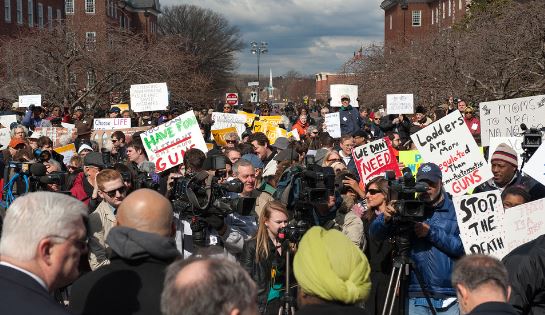


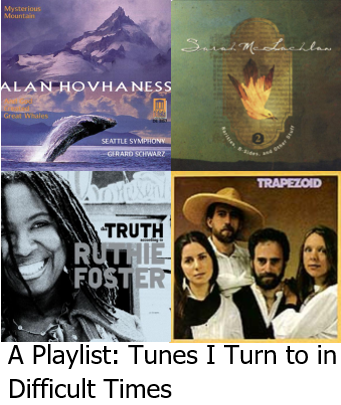
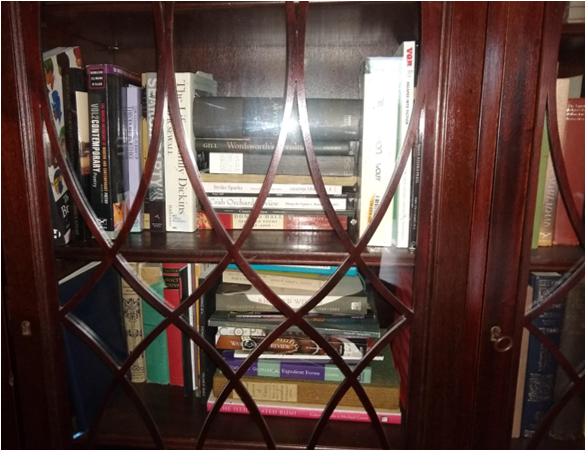
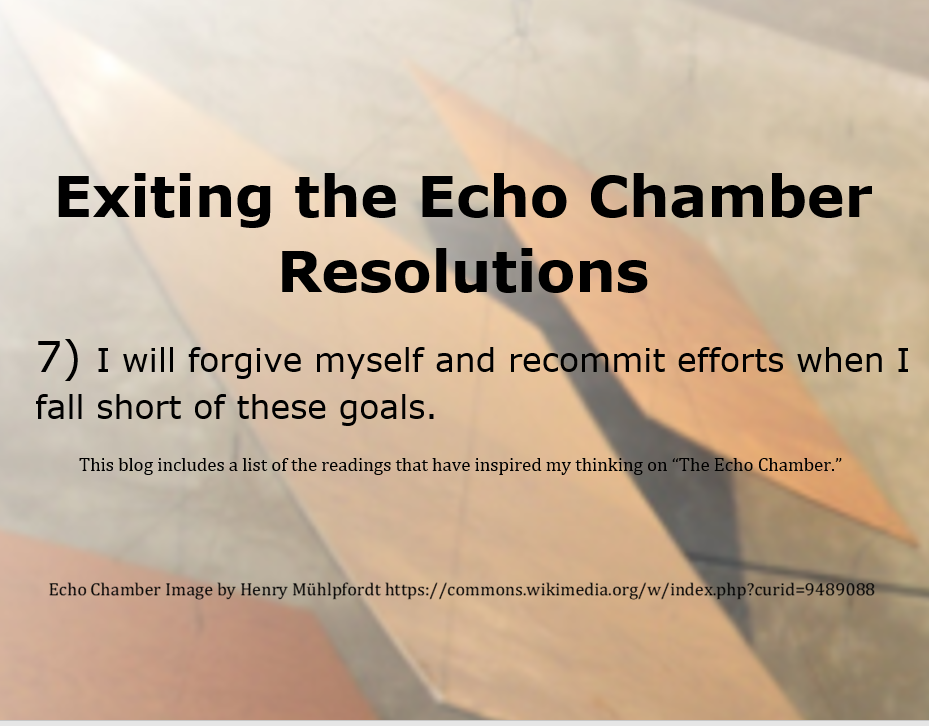
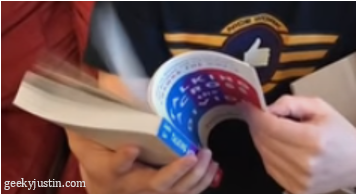

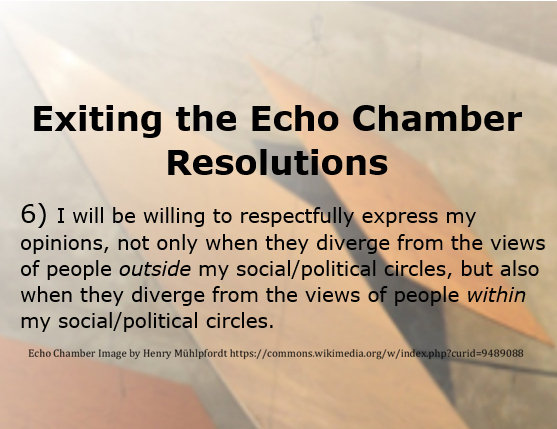
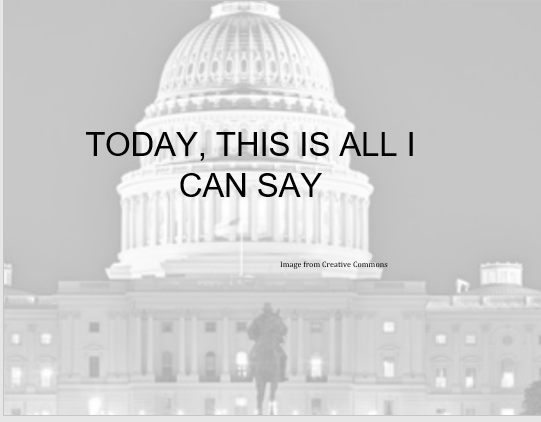
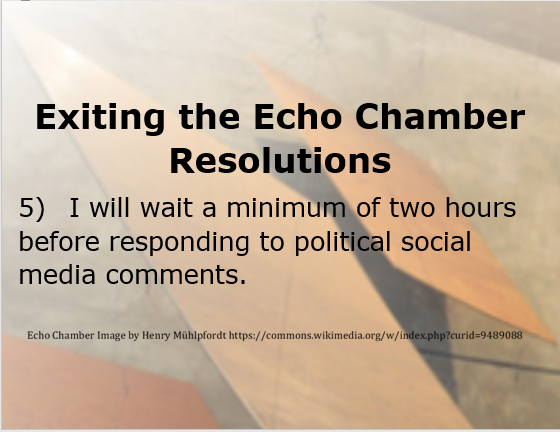
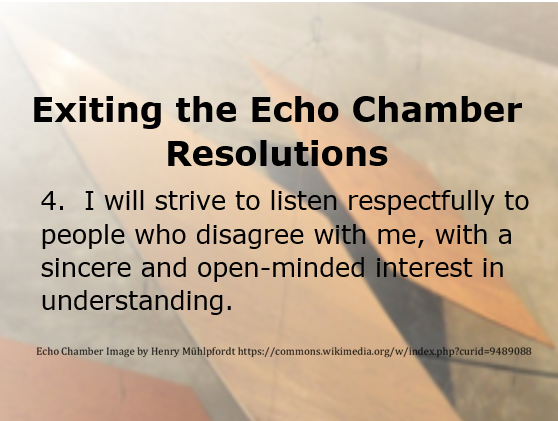
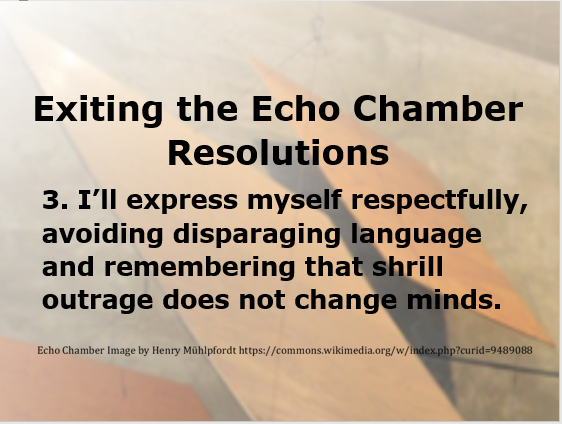
 RSS Feed
RSS Feed